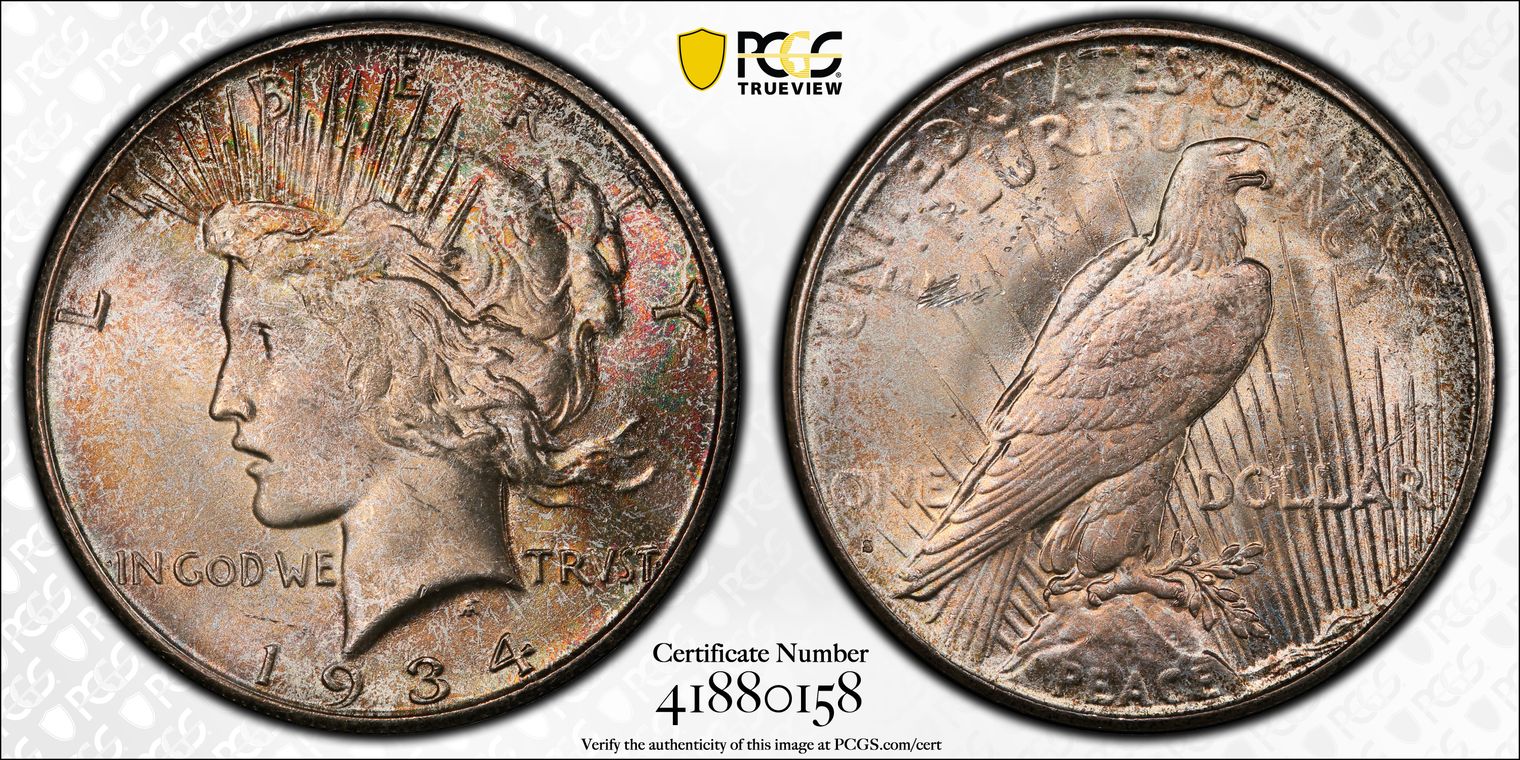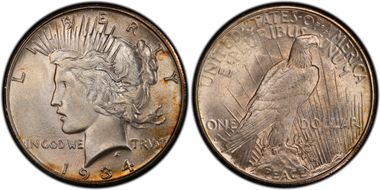1934-S $1 MS64+ 认证号41880158, PCGS号7377
专家评论
Q. David Bowers
The following narrative, with minor editing, is from my "Silver Dollars & Trade Dollars of the United States: A Complete Encyclopedia" (Wolfeboro, NH: Bowers and Merena Galleries, Inc., 1993).Numismatic Information
Commentary: Today, the 1934-S Peace dollar is considered to be the rarest variety in Mint State grades up through MS-64, the key to the series. It was not always so, and there was a time in the early 1940s when the 1925 Philadelphia dollar, for example, was priced higher, considered to be rarer, and was in greater demand than the 1934-S.
The lack of attention paid to the 1934-S in the early days is evidenced by advertisements…which indicate that it was "just another Peace dollar" at the time. For example, in the February 1943 issue of The Numismatist, Indianapolis dealer Lu Riggs offered Uncirculated 1934-S Peace dollars for $1.75 each, the same price charged for 1921, 1922-S, 1923-D, 1923-S, 1927, 1927-D, 1928, 1928-S, 1934, and 1934-D dollars. In other words, it was considered to be one of the cheapest, commonest varieties. By comparison, Riggs charged $2.50 each for these Peace dollars, each considered to be more elusive than the 1934-S at the time: 1922-D, 1925, 1925-S, 1926-D, 1926-S, and 1927-S. Only the 1922 Philadelphia Mint dollar was cheaper than the 1934-S!
The reason for this low price in the early 1940s, which by today's hindsight seems remarkable, is two-fold:
1. The 1934-S was minted just nine years earlier. It was a modern coin and thus was relatively ignored. It had not yet become "seasoned" by time.
2. At the San Francisco Mint, quantities of 1934-S (and most other S-Mint Peace dollars, and many S-Mint Morgan dollars) could be obtained in 1,000-coin bags at face value. However, to be perfectly objective, I have come across no accounts of any dealer buying bag quantities of 1934-S. In a conversation with Norman Shultz in the 1960s, he told me that in the early days of the market - which in the silver dollar market means pre-1962 - he was able to buy quantities of many San Francisco Mint dollars at face value plus a premium for handling, from sources in the San Francisco area. In the 1940s, he would typically buy a few dozen rolls at a time, not bags. As noted numerous times earlier in the present text, Peace dollars were neither widely collected nor were they objects of investment desire during the 1940s.
I suspect, but do not really know, that 1934-S dollars were simply ignored by dealers in the 1940s, for they falsely believed that hundreds of thousands were still stored in San Francisco or in banks, and that the 1934-S was common. Later, they found out that many if not most 1934-S dollars had been paid out at face value in the 1930s, went into circulation, and became worn, and that Mint State coins were rare. Precisely the same situation happened with 1936-D Washington quarters; everyone thought they were common, but years later, when dealers and col-lectors began to search for them, few could be located.
By 1947, the 1934-S was conspicuous by its absence from typical dealer listings of Uncirculated Peace dollars that would offer nearly every other date and mintmark. In the same year, William Pukall, a New Jersey dealer, priced an EF 1934-S for $7.50, or more than an Uncirculated 1934-S sold for just a couple of years earlier (at the sale of the Frederick C.C. Boyd Collection in 1945, a Mint State 1934-S fetched $4.50, for example). Still, there was no hue and cry by dealers seeking to locate the date. They felt that sooner or later a number of bags would come on the market, as had happened so often with other Peace dollar issues (except for 1921), and the 1934-S would once again become common.
As Treasury holdings of San Francisco Mint dollars were distributed from the San Francisco Mint, various Federal Reserve banks, and elsewhere in the 1950s, the rarity of various silver dollar issues sorted itself out. By the early 1960s, Uncirculated specimens of the 1934-S had been largely absent from dealers' stocks for nearly 15 years. Often, listings of Mint State Peace dollars would commence with 1921 and end with 1935-S, and give prices for each issue, except for 1934-S which would be marked "Wanted."
In the 1950s, the 1934-S dollar was considered scarce, but not rare. A San Francisco dealer told me that he personally saw over one million coins still stored at the local mint, which made a good story, and one that impressed me at the time. The same dealer was interviewed by me later and did not remember having seen such a hoard; thus, it falls into the category of an entertaining numismatic tale.
I estimate that perhaps a bag or two or three (1,000 to 3,000 coins) saw distribution from the San Francisco Mint in the late 1940s through the mid-1950s. Probably, many thousands more were released from the mid-1930s through the mid-1940s. As noted, price data reproduced earlier in this text, from dealers' advertisements, indicate that the 1934- S was not realized for its rarity until the 1950s, although prices had risen beginning in the late 1940s.
A hoard of several hundred pieces turned up in San Francisco in the early 1960s (per Wayne Miller and others) and was distributed over a long period of time. At the January 1978 Florida United Numismatists Convention, a group of 35 pieces was broken up; by that time, such a holding was considered unusual.
Circulated grades: Worn 1934-S dollars are scarce in comparison to many other Peace dollar varieties, but enough exist that until recent decades there was little premium attached to them. I recall seeing them in quantity in mixed bags of worn coins I looked through in the 1950s. In high EF or lustrous AU grade the 1934-S is on the scarce side, perhaps more so than earlier realized (at least this is Wayne Miller's opinion, and few are more conversant with the series than he).
Mint State grades: The 1934-S is readily available in higher Mint State grades such as MS-63, 64, and 65. Most specimens have a bright, lustrous, and somewhat satiny surface that is very pleasing to view. Bagmarks are usually minimal, a general rule that applies to the various Peace dollar issues of 1934 and 1935. The striking quality is usually decent as well.
Although on an absolute basis-considering the total population of high-grade worn coins plus Mint State pieces-the 1934-S is the key date, in MS-65 grade it is by no means the rarest Peace dollar and is outranked by several others, among which are the 1923-S, 1924-S, and 1928-S.
John Highfill on the 1934-S: In his Comprehensive Encyclopedia, John Highfill gave this advice to anyone seeking to build a set of Peace dollars:
Start with a 1934-S first and work on the rest of the series later. Always buy the keys and semi-keys first. Constant demand for all key issues keeps the premiums high throughout the decades. They are also less volatile during market swings.
John Kamin on the 1934-S: John Kamin, publisher of The Forecaster newsletter, furnished these comments: (Letter to the author, September 8, 1992.)
I believe the 1934-S silver dollar is the main coin in the series, and the first place one should start if collecting Peace dollars, followed by the 1927-S, 1928, and 1928-S. After all, every Peace dollar collector is going to, sooner or later, need the 1934-S. Even today, MS-63 prices appear to be a great bargain, and comprise most of the value of a complete set of Peace dollars.
The first coin to check, if you are buying an already assembled complete set of Peace dollars, is the 1934-S to see if it's a slider. Probably half the Peace dollar sets offered to me as Uncirculated have a slider for the 1934-S (such sliders circulated coins, but these are barely detectable from Mint State pieces).
I believe that, given time, the 1934-S Peace dollar in MS-60 to MS-63 condition will eventually occupy a traditional collector-desired position in the Peace dollar series, as the 1893-S Morgan dollar in MS-60 to MS-63 condition occupies in the Morgan series, as also does the 1895 Proof-60 to 63 silver dollar in the Morgan series-namely the last coin that most collectors buy-with usually the highest amount of money spent for any coin in 60 to 63 grades!
Caveat emptor: A few forgeries of the 1934-S have been made by affixing S mintmarks from other dollars onto genuine 1934 Philadelphia coins. To detect these, use 20x or higher magnification to study the junction of mintmark and field. Ideally, examine the coin with a binocular microscope, tilt the coin nearly upright and focus on the junction. An added S will show a split or seam all the way around; a genuine S will show flow lines continuous with surrounding field.
Varieties
Circulation strikes:
1. Breen-5734. Hub combination III-B2. VAM-1. All have micro S mintmark. On VAM-2 the mintmark' leans left.
Dies prepared: Obverse: Unknown; Reverse: Unknown.
Circulation strike mintage: 1,011,000
Estimated quantity melted: Unknown.
Characteristics of striking: Usually somewhat lightly struck and grainy on the eagle at the center of the reverse. Often seen lightly toned.
Known hoards of Mint State coins: Bags were paid out from the San Francisco Mint in the 1940s and 1950s, but most went into circulation instead of into numismatic circles; after then, large quantities were rare on the market. No quantities were in the 1962-64 Treasury release. Occasionally, 20- coin rolls came on the market in the 1960s and 1970s.
Commentary
This is the key Peace dollar issue in Mint State.
PCGS #
7377
设计师
Anthony de Francisci
边缘
Reeded
直径
38.10 毫米
重量
26.73 克
铸币数量
1011000
金属成分
90% Silver, 10% Copper
更高评级数量
302
评级较低的钱币数量
7567
地区
The United States of America
价格指南
PCGS 数量报告
拍卖 - PCGS 评级的
拍卖 - NGC 评级的
稀有性和存量估计 了解更多
| 所有评级 | 35000 |
| 60或以上 | 4500 |
| 65或以上 | 300 |
| 所有评级 | R-2.6 |
| 60或以上 | R-4.1 |
| 65或以上 | R-6.4 |
| 所有评级 | 1 / 23 TIE |
| 60或以上 | 1 / 23 |
| 65或以上 | 6 / 23 TIE |
| 所有评级 | 1 / 24 TIE |
| 60或以上 | 1 / 24 |
| 65或以上 | 6 / 24 TIE |






















